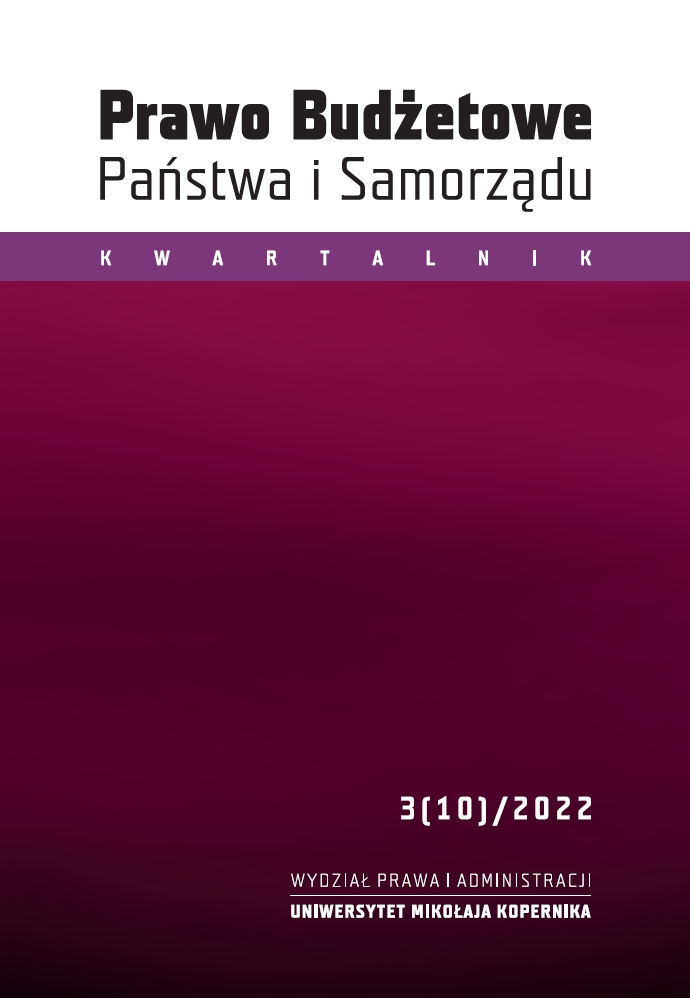An impact of a digital revolution on international principles on distribution of taxation rights
DOI:
https://doi.org/10.12775/PBPS.2022.018Keywords
OECD, digitalization, significant economic presence, taxesAbstract
The article focuses primarily on activities taken by the OECD to solve tax problems resulting from a spread of new business models of the digital economy. Those models include in particular a concept of a significant economic presence and a Two-Pillar Solution. In subsequent parts of the text, the Author presents proposals put forward by the authors of publications in a field of international tax law. Finally, de lege ferenda postulates regarding a direction and a scope of changes in the taxation rules for enterprises from the digital industry have been formulated.
References
Addressing the Tax Challenges of the Digital Economy, Action 1 – 2015 Final Report, OEDC 2015, https://read.oecd-ilibrary.org/taxation/addressing-the-tax-challenges-of-the-digital-economy-action-1-2015-final-report_9789264241046-en, (dostęp: 27.11.2022 r.).
Addressing the Tax Challenges of the Digitalisation of the Economy. Public Consultation Document, OECD 2019, https://www.oecd.org/tax/beps/public-consultation-document-addressing-the-tax-challenges-of-the-digitalisation-of-the-economy.pdf, (dostęp: 27.11.2022 r.).
Asen E., Bunn D., What European OECD Countries Are Doing about Digital Services Taxes, Tax Foundation 22.11.2021, https://taxfoundation.org/digital-tax-europe-2020/, (dostęp: 27.11.2022 r.).
Avi-Yonah R.S, Halabi O., A Model Treaty for the Age of BEPS, “Law & Economics Working Papers” 2014, nr 103, s. 1–40.
Barake M., Chouc P-E., Neef T., Zucmann G., Revenue effects of the global minimum tax: country-by-country estimates, EU Tax Observatory 2021, https://www.taxobservatory.eu/wp-content/uploads/2021/10/Note-2-Revenue-Effects-of-the-Global-Minimum-Tax-October-2021.pdf, (dostęp: 27.11.2022 r.).
Goel A., Goel S., Has the Permanent Establishment Rule Outlived Its Utility in a Digitalized World?, “NUJS Law Review Issue” 2018, nr 1, s. 25–47.
Hongler P., Pistone P., Blueprints for a New PE Nexus to Tax Business Income in the Era of the Digital Economy, “WU International Taxation Research Paper Series” 2015, nr 15, s. 2–63.
Izuaka M., Why Nigeria didn’t sign OECD minimum corporate tax deal — FIRS, ”The Premium Times Nigeria” 30.11.2021, https://www.premiumtimesng.com/news/more-news/498198-why-nigeria-didnt-sign-oecd-minimum-corporate-tax-deal-firs.html, (dostęp: 27.11.2022 r.).
Kennedy J., How digital disruption changed 8 industries forever, “Silicon Republic” 25.11.2015, https://www.siliconrepublic.com/business/digital-disruption-changed-8-industries-forever, (dostęp: 27.11.2022 r.).
Krzemińska I., Propozycje opodatkowania znaczącej obecności cyfrowej w Unii Europejskiej, „Krytyka Prawa” 2019, nr 2, s. 89–102.
Laskowska M., Nowe międzynarodowe reguły podziału dochodu w gospodarce cyfrowej według OECD, „Przegląd Podatkowy” 2020, nr 12, s. 29–42.
Losada S.R., In pursuit of fair taxation of digital economy¸ 2019 AALS Annual Meeting Papers, https://am.aals.org/past/am19/materials/ (dostęp: 27.11.2022 r.).
OECD tax deal is a mockery of fairness, Oxfam International 08.10.2021, https://www.oxfam.org/en/press-releases/oecd-tax-deal-mockery-fairness-oxfam, (dostęp: 27.11.2022 r.).
Plekhanova V., Value Creation within Multinational Platform Firms: A Challenge for the International Corporate Tax System, “eJournal of Tax Research” 2020, nr 2, s. 280–320.
Ratajczak M., Tadeusz Kościński dla money.pl: Prace nad podatkiem cyfrowym powinny przyśpieszyć, money.pl 22.01.2020, https://www.money.pl/gospodarka/tadeusz-koscinski-dla-moneypl-prace-nad-podatkiem-cyfrowym-powinny-przyspieszyc-6470420698101889a.html, (dostęp: 27.11.2022 r.).
Ricardo S., Schmitz F., Towards a broader concept of permanent establishment: a study in light of the digitalization of the economy and the BEPS Era, Uniwersytet w Lizbonie, Lizbona 2019.
Šestáková M., Redefining the “Permanent Establishment” Concept to Make Its Measurement More Relevant For a Digital Economy, “Proccedings of the 13th International workshop on knowledge management” Bratysława 2018.
Shalal A., Nienaber M., Thomas L., U.S. drops ‘safe harbor’ demand, raising hopes for global tax deal, “Reuters 26.02.2021, https://www.reuters.com/article/us-g20-usa-oecd-idUSKBN2AQ2E6, (dostęp: 27.11.2022 r.).
Spinosa L., Chand V., A Long-Term Solution for Taxing Digitalized Business Models: Should the Permanent Establishment Definition Be Modified to Resolve the Issue or Should the Focus Be on a Shared Taxing Rights Mechanism?, “Intertax” 2018, nr 6–7, s. 476–494.
Statement on a Two-Pillar Solution to Address the Tax Challenges Arising from the Digitalisation of the Economy, OECD 2021, https://www.oecd.org/tax/beps/statement-on-a-two-pillar-solution-to-address-the-tax-challenges-arising-from-the-digitalisation-of-the-economy-october-2021.pdf, (dostęp: 27.11.2022 r.).
Wiceminister finansów: minimum 15-procentowana stawka podatku dla globalnych firm od 2023 roku, Polska Agencja Prasowa 25.10.2021, https://www.pap.pl/aktualnosci/news%2C980838%2Cwiceminister-finansow-minimum-15-procentowa-stawka-podatku-dla-globalnych, (dostęp: 27.11.2022 r.).
Woźniak T., Powstanie zakładu a unikanie opodatkowania w międzynarodowym prawie podatkowym, Wolters Kluwer, Warszawa, 2022.
Zygmuntowski J.J., Chojecka K., Roy S.A, Podatek cyfrowy od gigantów. Ekspertyza w zakresie wprowadzenia w Polsce podatku cyfrowego (DST), “Instrat Policy Paper” 2020 nr 2, s. 1–53.
Downloads
Published
How to Cite
Issue
Section
License
Copyright (c) 2023 Kamila Morawska

This work is licensed under a Creative Commons Attribution-NonCommercial 4.0 International License.
Stats
Number of views and downloads: 782
Number of citations: 0
